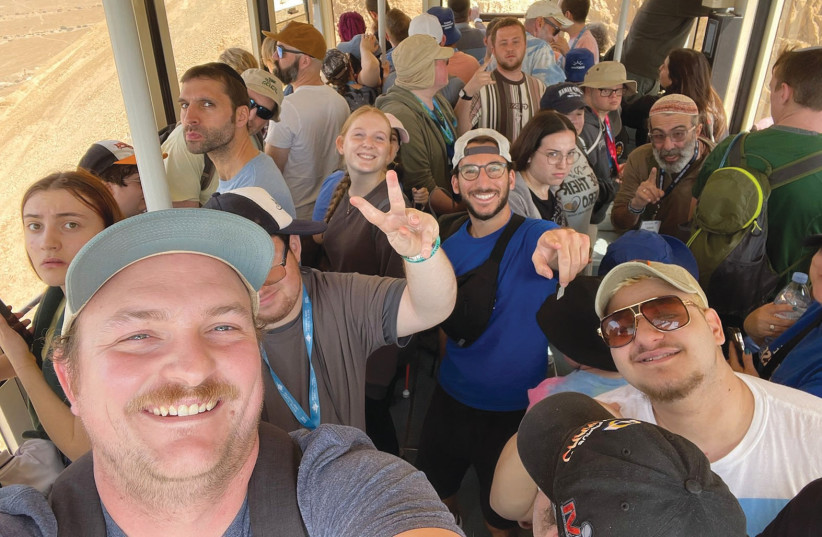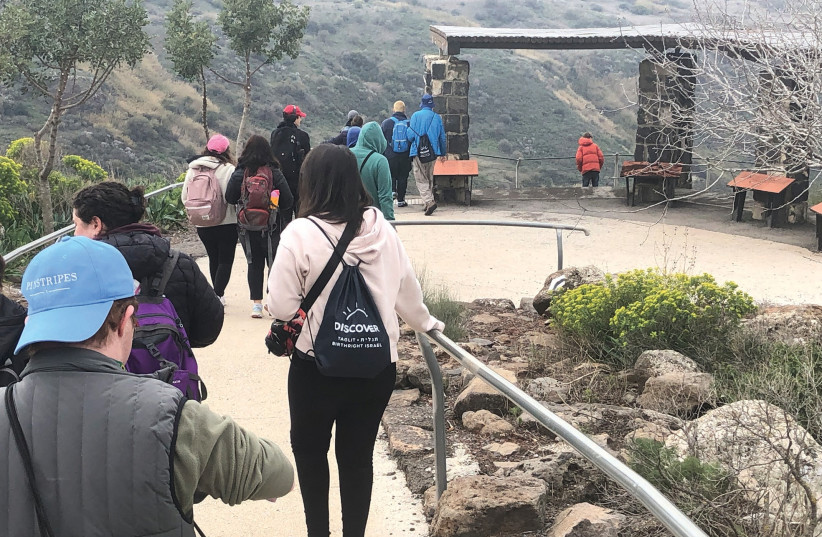Birthright Israel: Making trips accessible for Jews with disabilities - The Jerusalem Post
Henry Goldstein, 22, has high support needs. He has difficulty with expressive language and uses only one to three words at a time to express himself. He also has epilepsy. He understands most spoken language, but requires a lot of visual cues in order to understand a set of instructions. He needs to eat something high in protein every few hours, and his epilepsy sometimes causes him to freeze while walking, making group activities a potential challenge.
Yet, Goldstein was able to travel to Israel with a group of similarly-challenged young adults on a Birthright Israel trip this past February, accompanied by a one-on-one companion.
"He was just over-the-top happy for the whole trip," said his mother Pam, who, together with her husband Mark, had initially discounted the possibility of sending Henry on Birthright.
"It was a lot for us to send him to overnight camp," they said. But when they received a personal email about Birthright from trusted professionals at the Camp Ramah Tikvah program, where Henry goes every summer, they decided to look into it.
"With the one-on-one companion, I was willing to take the chance, and it was spectacular," Pam said.
 RIDING THE cable car up to the top of Masada. (credit: HOWARD BLAS)
RIDING THE cable car up to the top of Masada. (credit: HOWARD BLAS)Birthright brings young Diaspora Jews to Israel on free, whirlwind 10-day trips. Any young adult aged 18-26 who has one Jewish parent (or has converted to Judaism) and has spent less than three months in Israel is eligible to participate in a Birthright trip.
The trip, with its emphasis on physical activity and educational content, traditionally includes lots of traveling, hiking, tours of historical sites and museum visits. For the average participant, this is not a problem. But for those with intellectual or physical disabilities, such an itinerary would make this type of trip difficult, if not impossible.
What most people don't realize is that Birthright also hosts trips geared toward young Jews who fall outside the average.
The Goldsteins took a vacation in Israel at the same time as Henry's Birthright trip, "just to be on the same airplanes." They kept a respectful distance from their son while in Israel and just let him have the Birthright Israel experience. "It was an opportunity for him to really learn about Israel, experience Israel, with a bunch of his peers in a safe environment," they said. "It was great for him."
HOWARD BLAS, the national director of Camp Ramah's Tikvah Network, is at the forefront of promoting trips like Henry's. Tikvah, which celebrated its 50th anniversary in 2020, provides the Jewish overnight camp experience for teens and young adults with a range of intellectual, developmental and learning disabilities. There are currently Tikvah programs at every Camp Ramah campus in North America.
Blas, a social worker and special education teacher, leads Birthright trips for young people with disabilities. On the day that The Jerusalem Post visited the group, Blas was on medication duty during dinner at the McDonald's on Ben-Yehuda Street. He displayed the group's meticulously crafted printed schedule, with each day's activities designed to accommodate a range of physical and intellectual capacities while maintaining the integrity of the classic Birthright Israel experience.
Blas also introduced several participants who were eagerly tucking into their burgers. Overall, they were very enthusiastic about the trip. That day, they had visited Yad Vashem and Mount Herzl, so the tone was slightly more somber than usual.
The staff was happy to chat, while also making sure that the participants were eating and taking their medication.
The Goldsteins acknowledged that the overall success of the trip, and Henry's positive experiences, were the result of the staff's group effort. But they also pointed out Blas's involvement. "It was hugely successful, and a lot of that was Howard making it accessible," they said.
Those who staff the trips are not alone in their efforts to make Birthright accessible to all young Jews. Elizabeth Sokolsky, director of Birthright Israel North America, coordinates with Israel-based organizations and North American organizations to make sure each trip goes smoothly. She has always been very passionate about accessibility.
"From the beginning of Birthright Israel, I felt very strongly that if we're saying that this is a gift that every young Jewish person, 18-26 is entitled to the trip, then it should include everybody regardless of any disabilities or anything else. If we can't make all of our trips accessible, let's at least make sure that we can be accessible to anybody who wants to come."
Elizabeth Sokolsky
"From the beginning of Birthright Israel, I felt very strongly that if we're saying that this is a gift that every young Jewish person, 18-26 is entitled to the trip, then it should include everybody regardless of any disabilities or anything else," Sokolsky said. "If we can't make all of our trips accessible, let's at least make sure that we can be accessible to anybody who wants to come."
Although accessibility coordination is not technically in Sokolsky's job description, she oversees all the accessible programming in some capacity. She also makes sure that funds are raised in order to accommodate specialty groups and individuals with unique needs on regular trips.
SOKOLSKY NOTED that there are also specialty trips for recovering addicts, as well as for individuals with complex medical conditions that are physical, not cognitive.
Trips for recovering addicts run once or twice a year. They are almost identical to typical Birthright trips, but they have extra staff trained in addiction recovery and arrangements are made for participants to attend 12-step program meetings.
Yael Tamari is the director of Israel Free Spirit, the branch of the Orthodox Union that runs Birthright trips for, among others, those in recovery and those with complex medical needs. She noted that regular Birthright trips may also have participants recovering from addictions; however, the specialized trips provide a "safe and protective environment" without the social pressure to get drunk or high.
"The people coming on these trips have already made many courageous choices to live," Tamari said. "That's a choice that they have to make daily."
Sokolsky, who was at a wrap-up session on the last day of one of the recovery groups, recalled that they kept on talking about rafting down the Jordan River. "So I figured something must have happened while they were rafting. I pulled over two participants, and they said, 'For years, we've learned to only be dependent on ourselves. We can't rely on anybody else. We have to be really in our head and grounded all the time.
"'We were on the fourth day of the trip, and had to work together to manage these rafts and not fall out. Then someone fell out, and we were laughing. I don't think any of us remembered having laughed so much and so hard for so long.'"
 A HIKE AT Gamla in the Golan. (credit: HOWARD BLAS)
A HIKE AT Gamla in the Golan. (credit: HOWARD BLAS)THE TRIP for those with complex medical needs differs the most from a typical Birthright itinerary, although participants still see the sights and learn about the country, just as anyone on a Birthright tour does.
Since a lot of medical equipment is often needed, participants stay in one or two hotels throughout the 10-day tour, rather than constantly moving from place to place. The hotels serve as a home base, and sightseeing is done in day-trip spurts. The staff-participant ratio is almost 2-1, and there are nurse practitioners on staff who are trained to handle the participants' unique needs.
The trip schedule also takes into account the added time it takes to move around. Only one wheelchair at a time can be in the lift, as participants get on and off the bus. Israel is also not the most physically accessible country, so trip organizers have to be creative. On a visit to the Western Wall, the bus pulled right up to the plaza and "looked like it was going to drive into the Kotel," Tamari recounted. Trip organizers had to take into consideration measures such as this for every site, to ensure that participants had the same access to their cultural roots as other young Jews.
"It's just a regular group," Tamari said, "but with a lot of extra equipment." She also pointed out that these trips tend to have the fewest number of visits to urgent care facilities, as most medical needs can be taken care of by the nurse practitioners.
"We walk around with a lot of equipment and a lot of chutzpa," Tamari added.
Every director, staff member and parent we spoke with had a unique point of view, but they all shared a desire to get the word out about accessible Birthright trips. "Not a lot of people know about these trips," Blas observed. Somehow, they fly under the radar.
"I think it's a holy mission, not to think accessible but to be accessible," Tamari said. "It enriches all of us. It's important to make sure we are not missing a link."
"Outreach seems to be a challenge," Sokolsky pointed out. "I would love more people to know about this."
Although Birthright offers a variety of other specialized tours, Sokolsky said that "if we've never done a certain type of program, we're open to it. We'd love to be able to accommodate more and more."
Thanks to the committed efforts of many players, Birthright is becoming increasingly accessible to any Jewish young adult who wants to experience the country. Hopefully, as awareness of accessible Birthright options spreads, these programs will become even more robust. ■
Comments
Post a Comment